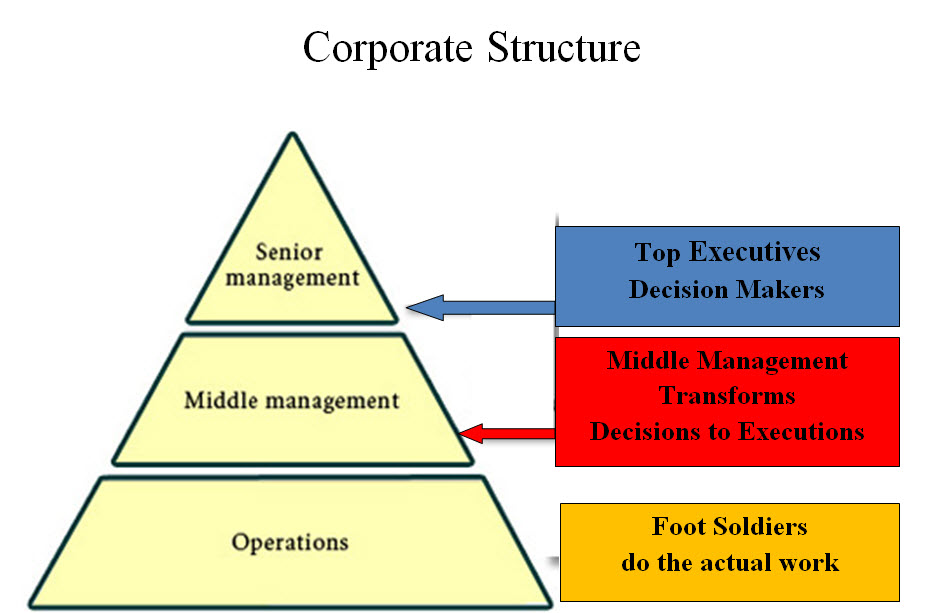How Middle Management Contributes To Employee Satisfaction And Company Profitability

Table of Contents
The Impact of Middle Management on Employee Satisfaction
Middle managers are not just supervisors; they are the architects of a positive and productive work environment. Their actions directly influence employee engagement, morale, and ultimately, retention.
Fostering a Positive and Supportive Work Environment
A positive work culture, cultivated by effective middle management, is the foundation of high employee satisfaction. This involves creating an atmosphere of open communication, mutual respect, and genuine support.
- Regular one-on-ones: These provide opportunities for open dialogue, feedback, and addressing individual concerns.
- Team-building activities: These foster camaraderie and collaboration, strengthening team cohesion.
- Constructive feedback: Providing regular, specific, and actionable feedback helps employees grow and feel valued.
- Celebrating successes: Acknowledging achievements, both big and small, boosts morale and motivates employees.
These actions significantly impact employee engagement, creating a positive work culture that fosters high team morale and improves employee retention.
Effective Communication and Feedback Mechanisms
Clear, consistent, and two-way communication is paramount. Middle managers must act as conduits, ensuring information flows seamlessly between upper management and the team. This transparency builds trust and fosters a sense of inclusivity.
- Regular team meetings: These provide platforms for updates, discussions, and addressing concerns.
- Open-door policy: Creating an approachable atmosphere encourages employees to voice their opinions and seek support.
- Effective communication channels: Utilizing various channels (email, instant messaging, etc.) ensures that communication is tailored to the message and audience.
- Actively soliciting feedback: Regularly seeking employee input demonstrates that their opinions are valued and contributes to improved communication strategies.
By implementing these strategies, middle management strengthens feedback loops, ensuring transparency and giving employees a voice.
Providing Opportunities for Growth and Development
Investing in employee growth is a key driver of satisfaction. Middle managers play a critical role in identifying talent and providing opportunities for professional development and career advancement.
- Mentorship programs: Pairing experienced employees with those seeking guidance fosters growth and builds valuable relationships.
- Training opportunities: Providing access to relevant training and skill development initiatives enhances employee capabilities.
- Skill development initiatives: Investing in employee skill development helps them stay current and boosts their confidence.
- Clear career paths: Providing clear pathways for career progression gives employees a sense of direction and purpose.
This focus on employee growth fosters a sense of investment and purpose, ultimately contributing to improved talent management and higher employee retention rates.
The Link Between Middle Management and Company Profitability
The impact of effective middle management extends beyond employee satisfaction; it directly impacts the company's financial health.
Driving Productivity and Efficiency
Effective middle management translates to increased productivity and operational efficiency. This is achieved through improved task delegation, optimized resource allocation, and streamlined processes.
- Clear goal setting: Setting clear, measurable, achievable, relevant, and time-bound (SMART) goals provides direction and focus.
- Effective delegation: Delegating tasks appropriately empowers team members and optimizes resource utilization.
- Process improvement initiatives: Identifying and implementing process improvements streamlines workflows and boosts efficiency.
- Monitoring performance metrics: Tracking key performance indicators (KPIs) allows for data-driven decision-making and continuous improvement.
These actions directly contribute to productivity improvement and resource optimization, leading to significant gains in operational efficiency.
Reducing Employee Turnover and Associated Costs
High employee satisfaction directly correlates with lower turnover. Reducing employee turnover saves a company significant financial resources.
- Recruitment costs: Replacing an employee is expensive, encompassing advertising, screening, interviewing, and onboarding.
- Training expenses: Investing time and resources in training new hires adds to the overall cost of turnover.
- Lost productivity: New hires require time to become fully productive, resulting in lost output during the onboarding period.
The cost of employee turnover can be substantial. Studies show that replacing an employee can cost anywhere from one-half to two times their annual salary. Effective middle management, by fostering a positive and supportive work environment, significantly reduces this cost.
Enhancing Innovation and Creativity
Empowered middle management fosters a culture of innovation and creativity. By encouraging risk-taking (within reasonable limits) and providing resources for experimentation, middle managers unlock the creative potential of their teams.
- Encouraging new ideas: Creating a safe space for employees to share ideas, regardless of their feasibility, stimulates innovation.
- Providing resources for experimentation: Allocating resources for testing new ideas fosters a culture of experimentation.
- Supporting risk-taking: Encouraging calculated risks and learning from failures helps teams develop innovative solutions.
This approach fosters problem-solving and strategic thinking, resulting in improved products, services, or processes – all key drivers of company profitability.
The Vital Role of Middle Management
In conclusion, effective middle management is not merely a component of a successful organization; it is a cornerstone. The strategies discussed—fostering a positive work environment, implementing effective communication and feedback mechanisms, providing opportunities for growth, and driving productivity and innovation—are crucial for boosting employee satisfaction and increasing company profitability. Investing in strengthening middle management, implementing effective middle management strategies, and improving middle management performance is an investment in the future success of your company. Don't underestimate the power of your middle management team—empower them, support them, and watch your organization flourish.

Featured Posts
-
 French Cinemas 2025 Rendez Vous What To Expect From The Festival And Awards Ceremony
May 23, 2025
French Cinemas 2025 Rendez Vous What To Expect From The Festival And Awards Ceremony
May 23, 2025 -
 Kolkata Knight Riders And Royal Challengers Bangalore Ipl 2025 Replacement Players Announced
May 23, 2025
Kolkata Knight Riders And Royal Challengers Bangalore Ipl 2025 Replacement Players Announced
May 23, 2025 -
 Wax On Wax Off Exploring The Life Lessons Of The Karate Kid
May 23, 2025
Wax On Wax Off Exploring The Life Lessons Of The Karate Kid
May 23, 2025 -
 The Countdown Continues Itv After Holly Willoughbys Exit
May 23, 2025
The Countdown Continues Itv After Holly Willoughbys Exit
May 23, 2025 -
 Colleagues Address Sheinelle Jones Absence From The Today Show
May 23, 2025
Colleagues Address Sheinelle Jones Absence From The Today Show
May 23, 2025
Latest Posts
-
 Memorial Day Weekend 2025 Ocean City Rehoboth And Sandy Point Beach Forecast
May 23, 2025
Memorial Day Weekend 2025 Ocean City Rehoboth And Sandy Point Beach Forecast
May 23, 2025 -
 2025 Umd Graduation Kermit The Frog To Deliver Commencement Address
May 23, 2025
2025 Umd Graduation Kermit The Frog To Deliver Commencement Address
May 23, 2025 -
 University Of Maryland Graduation A Notable Amphibians Inspiring Speech
May 23, 2025
University Of Maryland Graduation A Notable Amphibians Inspiring Speech
May 23, 2025 -
 The Muppet Who Will Speak At Umds 2025 Commencement
May 23, 2025
The Muppet Who Will Speak At Umds 2025 Commencement
May 23, 2025 -
 Kermit The Frogs Umd Commencement Speech A Hilarious Internet Sensation
May 23, 2025
Kermit The Frogs Umd Commencement Speech A Hilarious Internet Sensation
May 23, 2025
